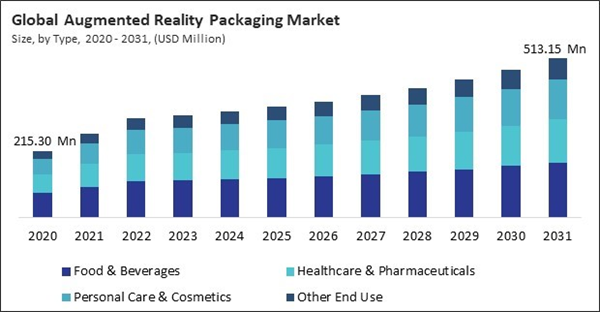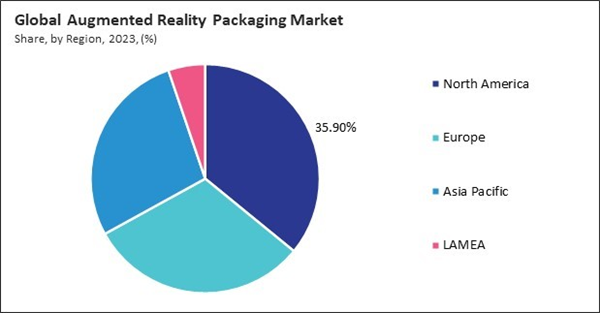AR packaging in this segment enhances the shopping experience by allowing consumers to visualize product applications, ingredient details, and brand storytelling through interactive elements. Many cosmetic brands leverage AR technology to offer virtual try-ons and personalized product recommendations, improving customer engagement and purchase confidence. Hence, the personal care & cosmetics segment held 1/4th revenue share in the market in 2023. The increasing demand for innovative and interactive beauty product packaging has driven the growth of AR adoption in the personal care & cosmetics industry.
AR packaging aligns with the preferences of younger demographics, including Gen Z and millennials, who value interactive and tech-driven shopping experiences. By integrating AR into packaging, brands can create a unique selling point that appeals to digital-native consumers, ultimately driving sales and enhancing brand loyalty in an increasingly competitive market. Additionally, AR packaging helps brands build stronger emotional connections with their audience. Companies can create meaningful consumer experiences beyond physical products by integrating storytelling elements into packaging. This strategy is particularly effective in industries where emotional engagement drives purchasing decisions, such as the baby care, pet food, and wellness sectors. Hence, increasing brand differentiation strategies in competitive markets propel growth.
However, integrating AR packaging into supply chains can be complex and costly. Companies must work with AR developers, printing partners, and digital marketing teams to ensure seamless execution. This level of collaboration requires substantial resources and planning, which may deter businesses from investing in AR packaging despite its potential to enhance consumer engagement. In conclusion, high initial investment and implementation costs for augmented reality packaging solutions hinder the market's growth.
Driving and Restraining Factors
Drivers
- Rising Consumer Demand for Interactive and Engaging Packaging Solutions
- Increasing Brand Differentiation Strategies in Competitive Markets
- Advancements in AR Technology and Widespread Smartphone Adoption
Restraints
- High Initial Investment and Implementation Costs for Augmented Reality Packaging Solutions
- Concerns Over Data Privacy and Security in AR-Enabled Packaging Applications
Opportunities
- Increasing Adoption of AR Packaging in the E-Commerce and Retail Sectors
- Favorable Government Initiatives and Regulations Supporting AR and Smart Packaging
Challenges
- Technical Challenges Related to Device Compatibility and User Accessibility
- Short Product Life Cycle and Limited Time for Consumer Engagement
End Use Outlook
Based on end use, the market is characterized into food & beverages, healthcare & pharmaceuticals, personal care & cosmetics, and others. The food and beverages segment garnered 36% revenue share in the market in 2023. The integration of AR technology in food and beverage packaging enhances consumer engagement by providing interactive product information, digital storytelling, and immersive brand experiences. Brands use AR-enabled packaging for marketing campaigns, nutritional information displays, and gamification, which helps attract and retain customers. The growing demand for smart packaging solutions, coupled with increasing consumer preference for transparency and interactive experiences, has fuelled the adoption of AR packaging in this segment.Regional Outlook
Region-wise, the market is analyzed across North America, Europe, Asia Pacific, and LAMEA. The North America segment recorded 36% revenue share in the market in 2023. The region’s strong presence of leading brands across industries such as food & beverages, healthcare, and cosmetics has driven the adoption of AR packaging solutions. Companies leverage AR to enhance consumer engagement, provide interactive product information, and create immersive brand experiences. Additionally, the growing trend of smart packaging, high smartphone penetration, and advanced technological infrastructure have further propelled market growth in North America.List of Key Companies Profiled
- Vossle
- SmartTek Solutions.LLC
- Zappar Ltd.
- FlippAR
- THIMM Group GmbH + Co. KG
- BrandXR
- PlugXR
- The Procter & Gamble Company
Market Report Segmentation
By End Use
- Food & Beverages
- Healthcare & Pharmaceuticals
- Personal Care & Cosmetics
- Other End Use
By Geography
- North America
- US
- Canada
- Mexico
- Rest of North America
- Europe
- Germany
- UK
- France
- Russia
- Spain
- Italy
- Rest of Europe
- Asia Pacific
- China
- Japan
- India
- South Korea
- Singapore
- Malaysia
- Rest of Asia Pacific
- LAMEA
- Brazil
- Argentina
- UAE
- Saudi Arabia
- South Africa
- Nigeria
- Rest of LAMEA
Table of Contents
Companies Mentioned
- Vossle
- SmartTek Solutions.LLC
- Zappar Ltd.
- FlippAR
- THIMM Group GmbH + Co. KG
- BrandXR
- PlugXR
- The Procter & Gamble Company










